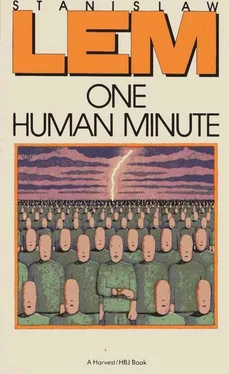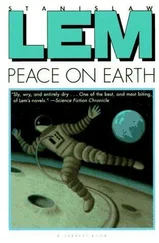The second edition of One Human Minute has been expanded by its publisher to include several new chapters; therefore, a fresh discussion is in order.
This time, the book opens with a picture of the world as mankind’s habitation. Such data can be found in any encyclopedia, but when they are converted to per-minute quantities, they undeniably produce a greater impression than do the dry, abstract entries in a reference book. It is indeed curious to realize that there is always a storm raging somewhere on Earth, and that the number of lightning bolts is constant: six thousand per minute. One hundred strike every second, and that means perpetually, month after month and century after century. We also learn here that the Earth covers 1,800 kilometers in the course of a minute of orbiting the Sun. In the same short interval of time, the combined weight of the cosmic “debris” falling constantly on the Earth’s surface amounts to thousands of tons. At the same time, our planet loses a considerable amount of its atmosphere, which, stirred by the movements of barometric high and lows, by cyclones and tradewinds, and also heated by the sun, creates its own “tail” stretching for many thousands of miles; the Earth loses, as a result, an enormous quantity of gas. New gases, however, constantly escape from the Earth’s depths; the oceans also emit them, partly as water vapor; and so on. The book, then, commences in the style of popular science. The figures reveal at once the vastness of the planet in relation to its inhabitants and the incredible minuteness of the planet in relation to the universe. But it is all, as I said, a laborious extract of natural-history textbooks.
Some of the chapters previously described have been enlarged by the authors with data now of a humorous, now of a macabre cast. Man as executioner, oppressor, and killer of his own species was presented to us in the first edition. Now we see what a predator he is, or, if you will, what a parasite of the entire biosphere — that is, the animal and plant kingdoms. Almost nobody sitting down to a steak or chop feels any pang of conscience; we do not even think that in our complicity with the butchers we are like one who aids a killer in the disposal of the victim’s remains. In order that the thought should never come to mind and interfere with our consumption of tasty morsels, all languages — without exception — have created a separate vocabulary which gives us special consideration. We pass away; animals can only die. And, of course, every dictionary of hunting jargon unfailingly exonerates all that is synonymous, in every legal language, with premeditated murder, since a hunter goes into the woods with a loaded weapon for the express purpose of killing. One Human Minute goes to the heart of the matter, cutting through these pharisaical subtleties of our vocabulary, for it gives not the names but the numbers of the victims. Every minute, it turns out, mountains of animal corpses fall at our hands, and the same mountains of corpses, in the form of roasts, are chewed by several billion human teeth per minute. These are like images from Gulliver’s travels to Brobdingnag, where a lady giant’s enticing smile might be a scene out of Jaws, with the shark opening its monstrous mouth. As we know, the brain of a live monkey eaten raw from the opened skull with a spoon is a sophisticated Chinese delicacy; and though it is unlikely that the quantity of brains consumed per minute in this way could have been established with much accuracy, one does find the figure under the heading “Exotic Dishes."
To the eternally shooting geyser of semen this edition has added the river of milk that flows from the breasts of women all over the world into the mouths of infants.
The human disfigurations that are set apart in a separate chapter — no doubt for more powerful effect — are a silent, natural expression of our fate. It is as if whoever set up this table — these armies of the blind and deaf, these millions of bodies deformed from birth and by their very number proving how little Nature truly cares about the individual human being (yet in all religions and nearly all philosophical systems we try so hard to preserve the human dignity of the individual), and these separately (pedantically) enumerated infirmities of old age — it is as if the author of this table wanted to compare the aged with rusting wrecks or derelict machines, which, though slowly disintegrating, preserve for a while their original contours.
Even medical procedures intended to maintain and save life are shown in their consequences in the chapter on disfigurations. There are mobs of armless and legless people after amputations; and radical surgery, the prevailing method of fighting cancer, now bestows upon the world, every minute, so many women with mastectomies, so many of both sexes sterilized, or with portions of intestines and stomachs removed. It is hard to run one’s eyes all the way down these columns of figures.
I am not alone in suspecting that the editors wished to intensify the “impact” of a book that, after all, like any thick volume of statistics, hardly makes for easy reading. The new chapters serve just this purpose, especially the highlighting of the figures dealing with children. Before, this subject was scattered under different headings, but now it has been decided to pull it together for easier viewing. The effect is nightmarish. The question again arises whether such information should be set forth in so cold and dry a manner, since the reader can react only with impotent grief, horror, and depression.
For a number of years now in the illustrated magazines of the wealthy nations there have appeared, fairly frequently, large ads showing photographs of a small child, usually swarthy and dark-haired; the charitable organization sponsoring the ad requests donations to save such children from starvation. And, again, we learn from the brutally accurate statistics that the number of children saved in this manner, compared with the number left to their fate, is a drop in the ocean. One might say that great moral wisdom lies in the statement from the old Mosaic law: “He who saves the life of one human being saves the world.” Perhaps, but that sort of commentary is absent from One Hitman Minute.
Since statistics give averages — often amusing us with facts like “Every husband is unfaithful 2.67 times a year" — and one of the qualities that distinguish our species from all others is the enormous range of life styles (luxury and poverty, for example, both equally unmerited), the book uses the so-called diagonal method along with print of different colors to dramatize just this range of fortunes. The commentary distinguishes the text from the Guinness Book: the latter focuses on the oddities of human behavior, on senseless stunts, whereas here the object is to contrast the affluent consumer societies, with their constantly increasing wealth, with those societies headed toward disaster. There are many comparisons — the energy used per minute per person in wealthy as opposed to poor countries, for example, which gives a clear picture of the ruinous poverty where dried dung or wood serves as fuel. One Human Minute goes beyond the boundary of its title here, providing other figures: for example, the forests in poor countries, cut down much faster than Nature can replace them, will revert to wasteland.
The financial side of things has also been given more space. It is not a trivial matter to learn the price tag of humanity’s religious beliefs (again, compared — maliciously — with the cost of arms). The treatment of church collections, tithes, and contributions as capital investments per minute, interest on which is to be paid out in the hereafter, speaks for itself. The commentary on these statistics disclaims any intention of scoffing, the issue being only the cost of maintaining religious institutions, a cost that is measurable whether or not “otherworldly dividends” are paid. (Added to the cost: the upkeep and overhead of cloistered orders, missions, and training for clergy of all faiths.) In a word, we learn how much humanity spends to “maintain good relations with the Lord."
Читать дальше












